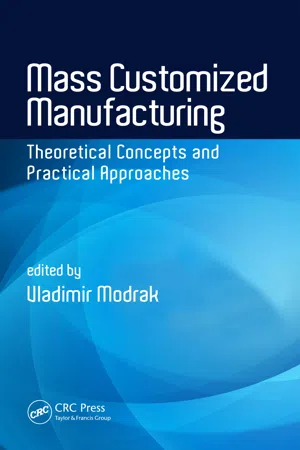![]()
section two
Complexity drivers in mass customization
![]()
chapter four
Complexity issues in mass customized manufacturing
Hendrik Van Landeghem and El-Houssaine Aghezzaf
Contents
4.1 Complexity in assembly
4.2 Modeling the DNA of complexity
4.2.1 Complexity definition
4.2.2 A causal model of complexity in manufacturing
4.3 Quantifying complexity in manual assembly stations
4.3.1 A brief literature review
4.3.2 Complexity-based classification of workstations
4.3.3 Quantifying the complexity of workstations
4.4 Reducing the adverse impacts of complexity
4.4.1 Line balancing to reduce work overload and smoothen complexity
4.4.1.1 Phase 1: Mixed-model line-balancing optimization
4.4.1.2 Phase 2: Sequencing and work overload optimization
4.4.1.3 Analysis of a prototype example
4.4.2 Operator information systems to reduce mental workload
4.5 Conclusions
References
ABSTRACT
This chapter focuses on the role of complexity and its impact on the human operator within assembly-oriented mass customized manufacturing (MCM). It starts with a definition of the main complexity concepts we need for a thorough understanding of this chapter, building on the previous chapters. It also argues that automotive manufacturing is currently a good representative example of MCM, as the number of variants and models continue to proliferate, and it is one of the few mature industries that practice MCM. Their size and heritage forces them to look for and adopt structural and methodical approaches to deal with complexity.
Next, the major drivers of complexity and their impacts on manufacturing systems are described and analyzed. These were derived from operator debriefings on complexity and how they experience it during daily work. These findings are based on a 3-year international research project (2010–2012) involving leading original equipment manufacturers (OEMs) in automotive and vehicle manufacturing in Belgium and Sweden. One result that is described is a fast and objective measurement to determine the complexity of a manual assembly station, based on a statistical classification model.
The last part of the chapter is devoted to some of the methodical approaches that can be used to manage complexity in MCM; some of these approaches are based on recent research results from our research team at Ghent University. An enriched method to balance manufacturing lines, minimizing variability of station takt times, is discussed. The main objective is minimizing overloads that prove to be most detrimental to operator cognitive loads, quality issues, and assembly errors. Also, technological developments to enhance the information exchange with operators in a complex MCM setting are discussed, using wearable devices and bidirectional information exchange.
4.1 Complexity in assembly
The trend toward mass customization in the automotive industry and the complexity it induces has been the focus of many studies in the last three decades. Specifically, the impact of increased product variety on the performance of automotive mixed-model assembly lines has already been studied by Fisher et al. (1995), MacDuffie et al. (1996), and Fisher and Ittner (1999).
In particular, MacDuffie et al. (1996) investigated the effect of product variety on total labor productivity and consumer-perceived product quality in an international study covering 70 assembly plants, from 16 countries, participating in the International Motor Vehicle Program at MIT. In their paper, they analyzed complexity measures that capture different aspects of product mixes in assembly plants: model mix complexity, parts complexity, option content, and option variability. Model mix complexity is based on the number of different platforms, body styles, and models, scaled by the number of different body shops and assembly lines in each plant. Parts complexity is measured as an aggregate index of six factors:
